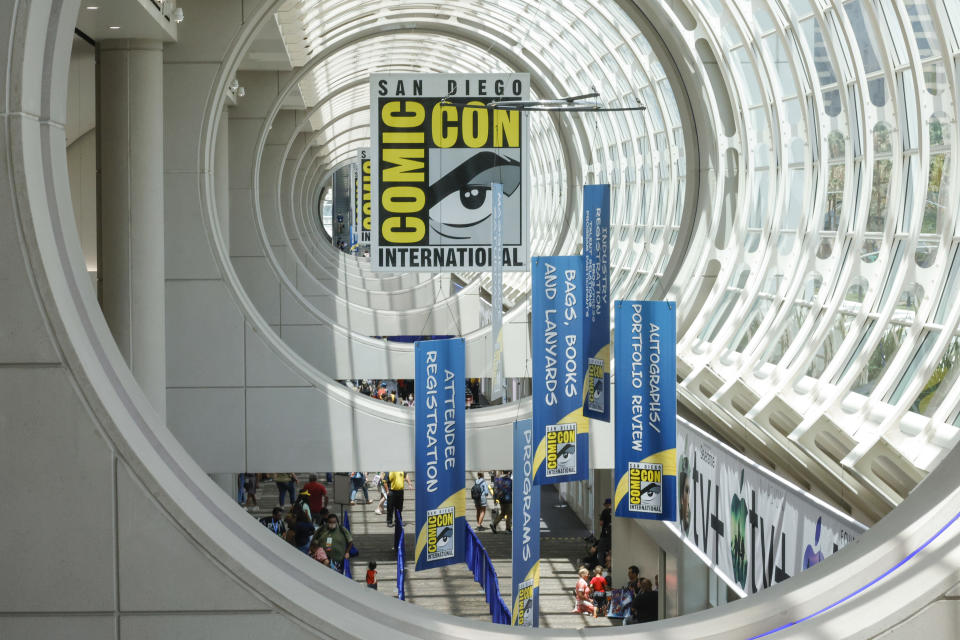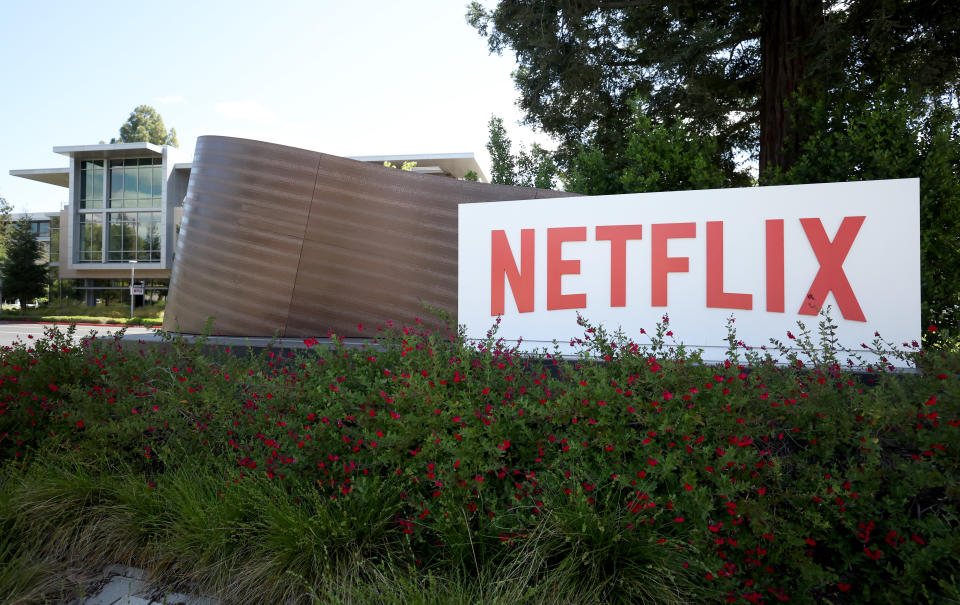What Happens To Hollywood (And Beyond) If The Actors Go On Strike

Hollywood is at a crossroads and the 160,000 actors that make up SAG-AFTRA are seemingly in the driver’s seat.
Will there be an actors strike, on top of the writers strike, which is in its ninth week? What happens if there are two strikes? Will SAG-AFTRA extend its negotiations with the studios and then strike? Or will they extend and strike a deal? Would an actors strike compound the pain across the entertainment industry that is already reeling from the writers strike?
More from Deadline
Deadline revealed Wednesday that SAG-AFTRA and the Alliance of Motion Picture and Television Producers are considering extending negotiations until next week (July 7) or later. This also would make sense given that most of Hollywood will be out of town for a long holiday weekend.
In addition to these questions, there are dozens of rumors flying around on the picket lines and Beverly Hills lunch spots. There’s talk that SAG-AFTRA isn’t as close to a deal as that video by Fran Drescher and Duncan Crabtree-Ireland suggested, and some are also saying that the DGA has been trying to encourage SAG-AFTRA leadership to take a deal, rather than strike.
RELATED: SAG-AFTRA “Prepared To Strike” Letter Hits 1,000 Signatures, Including Guild President Fran Drescher
The other big talking point is if the actors do join the writers on the picket line, which top executive or executives would step up to find a compromise? During previous strikes, it has required a Lew Wasserman (in 1960 and 1981) or, in the case of the 2007-08 shutdown, a group including Peter Chernin, Bob Iger, Barry Meyer, Michael Lynton and Les Moonves, to help strike a deal.
“In the past there’s always been some luminary from Hollywood that would [step up],” said one source. “[This year], I haven’t heard of anyone.”
One thing is clear: If SAG-AFTRA calls a strike, either at midnight PT on Friday or sometime next week, there would be huge ramifications for the entertainment industry.
Below, Deadline runs through many of the possibilities that likely would happen if the actors join the writers on the picket lines — from the total shutdown of scripted television and feature films to the impact on Wall Street and the studios’ bottom lines and the potential interruption of events such as the Emmys, Comic-Con and the fall film festival season.
TELEVISION
The majority of scripted TV series already have been shutdown as a result of the writers strike. Apart of a handful of series like the Kim Kardashian-starring American Horror Story, production largely has ground to a halt in L.A., New York and Atlanta.
Series such as J.J. Abrams’ Duster, The Penguin, Daredevil: Born Again, Billions, Robert De Niro’s Zero Day, The Old Man and Severance have shut down, while writing for shows such as Abbott Elementary, Yellowjackets, Stranger Things and Cobra Kai has been halted. Some shows such as Apple’s Metropolis, from Sam Esmail, have been shut down entirely.
However, if the actors walk, there would be more casualties. A large number of U.S. series are shooting abroad, particularly in the UK and Europe, and those also would shut down, largely having been out of the glare of picket signs up to now.
These include House of the Dragon, Andor and Industry, and a strike could affect new titles such as HBO’s Kate Winslet drama The Palace and Peacock’s Day of the Jackal remake. Sharon Horgan’s Bad Sisters was expected to start shooting shortly, while British series with U.S. involvement such as the now-Disney+ co-production Doctor Who all likely would be hit. Apple TV+’s Gary Oldman-starring Slow Horses is understood to have completed filming SAG-member Oldman’s scenes prior to the strike potentially being called.
The Lord of the Rings: The Rings of Power, which recently moved to the UK, is thought to have just finished shooting, so fans of Middle-earth can breathe slightly easier.
As SAG-AFTRA’s Global Rule One, which is more restrictive than WGA rules, says, “No member shall render any services or make an agreement to perform services for any employer who has not executed a basic minimum agreement with the union, which is in full force and effect, in any jurisdiction in which there is a SAG-AFTRA national collective bargaining agreement in place.”
In the U.S., the fall broadcast schedule, which already has been crushed by the writers strike, would be impacted further.
A SAG-AFTRA strike also would be expected to hit unscripted, which has started to pick up after a slow beginning to the writers strike. Many broadcast shows are hosted and exec produced by WGA and SAG-AFTRA talent, and we’ve heard of a handful of game shows and competition shows that have been forced to delay production as some actors are unwilling to cross the picket lines.
FILM
A full-on SAG-AFTRA strike definitely would mean a shutdown of feature Hollywood productions worldwide. Despite streaming execs’ swagger about being prepared for the WGA strike and their ability to weather it, prolonged SAG-AFTRA and WGA strikes trigger fear in the hearts of motion picture suits: The Q4 theatrical release calendar would become a desert.
RELATED: How A Hollywood Actors Strike Would Impact Blockbuster And Awards-Season Movies, Comic-Con & More
Currently, there are no plans by the major studios to move 2023 titles into 2024. As a result of the WGA strike, a domino effect was triggered for Disney, which delayed the release of several movies — some deep into 2026 and beyond as scripts weren’t ready. For instance: Avengers: Kang Dynasty going from May 2, 2025, to May 1, 2026, and Avengers: Secret Wars heading from May 1, 2026, to May 7, 2027.
Thunderbolts, which couldn’t shoot due to the WGA strike, hopefully will meet its Q4 2024 theatrical release, with Disney moving that Marvel movie from July 26 to December 20. Deadpool 3 will kick off summer next year during the first weekend of May, with the recently WGA-picketed Captain America: Brave New World getting pushed from May 3 to July 26, 2024.
Major feature shoots potentially shut down by a SAG-AFTRA strike include Paramount’s Gladiator 2, which is shooting in Europe, and Mission: Impossible – Dead Reckoning Part Two; Universal’s untitled Radio Silence monster thriller; Sony’s Venom 3; and Warner Bros’ Clint Eastwood drama Juror No. 2.
Other productions have been racing to beat the SAG-AFTRA strike and are poised to finish as soon as early July. Sony’s Bad Boys 4 recently wrapped in Atlanta and is only doing pick-up shots in Miami. Warner Bros’ Beetlejuice 2 starring Michael Keaton in London looks to wrap in early July. Sony’s Ghostbusters: Afterlife sequel has wrapped in London; ditto for Focus Features’ Amy Winehouse biopic Back to Black.
THE EMMYS & COMIC-CON
Hollywood loves a ceremony, and it’s clear that the Emmys are in the crosshairs of both the writers strike and the possible actors guild action. Deadline understands that July is a pivotal month for whether the annual TV awards will go ahead as scheduled on September 18.
We hear that planning conversations for the show, which is on Fox this year, will begin July 15, with a decision needed by the end of that month on whether the September date is possible. If the actors strike or there is an extension, it would be difficult from a logistical point of view. It’s also a date SAG-AFTRA and the WGA are aware of, so it’s likely something the unions are using for leverage. If the Emmys are rescheduled, we hear that it’s likely that the 75th anniversary show would pivot to January.
When it comes to feature-related events in the near future being rocked by the strike, it’s San Diego Comic-Con.

Already, many TV creators due to WGA picketing can’t head down to the fanboy confab to sit on panels; among those sitting on the sidelines include Sony, Marvel Studios, Lucasfilm, Netflix and Universal. Studios such as Warner Bros and Paramount, which have events planned pegged to their respective releases Blue Beetle and Teenage Mutant Ninja Turtles, are in a wait-and-see mode: If talks are ongoing between the AMPTP and SAG-AFTRA and no strike is called, actors could show up at SDCC and make it a higher-wattage event than what’s currently anticipated.
Comic-Con is set to announce its full lineup after July 4.
While studio premieres currently are planned for Barbie on July 9 in L.A. and for Oppenheimer in New York on July 17, at the very minimum of an actors strike, their respective directors Greta Gerwig and Christopher Nolan would show up.
INDIE FILM
Indie filmmakers were hosed this spring and summer, unable to get bonded for anything that wasn’t sure to wrap before June 30 — sometimes well before. Projects fell away including Pawel Pawlikowski’s Joaquin Phoenix and Rooney Mara-starrer The Island, which shut down in late May on the eve of shooting. Some plan to return to production in the fall, but not all can.
RELATED: Independent Films Unblocked: SAG-AFTRA Waivers Would Let Some Productions Work Through A Strike
There is hope, however, in waivers for qualified independent films. SAG-AFTRA has been fielding inquiries and applications for these interim agreements for the past few weeks but won’t actually grant them until the current contract expires, which raises a major question if talks are extended. Does June 30 remain the official end of the current contract, or does the official end date move to the next deadline? It’s a big issue for productions looking to start in July.
Producers must agree to terms sight unseen – the guild asks them to adhere to its latest proposals, which are not public. Last time around, waivers required agreeing to final deal terms. The just-ratified DGA agreement calls for a 5% increase in wages and benefits the first year, if that’s any guide. “It’s not like holding out gets you to a better place, but maybe people can spin it out longer,” said one indie source. “Most actor pay goes to big stars who are paid above scale anyway.”
The status of films is sensitive, and it’s hard to get a sense how many of them have been caught flat-footed and how many sat back to wait it out until year-end, meaning the issue actually might become acute three months down the road.
“Obviously everybody was at Berlin and Cannes selling projects not yet made,” the source added. “My guess is they went to contract and got their clearances from SAG before we hit this speed bump.”
A lot of indie product made going into and during Covid remains to be sold and could help fill pipelines.
Meanwhile, independent productions with absolutely no connection with any AMPTP company theoretically can carry their waivers to financiers and bond companies, who could theoretically accept them. But maybe not so fast because of hyped-up activity on picket lines. There’s production risk if actors who can work don’t want to cross.
An even bigger issue for productions in the U.S. are the Teamsters, which haven’t been crossing WGA picket lines even if actors will.
“If the union grants the waiver, and the talent refuses to work, where do you take that? You still don’t have a film. You might have a lawsuit,” said the source.
“We haven’t done much at all in the U.S. since Covid, as other jurisdictions had government-backed insurance schemes in place,” said one UK-based indie financier. “For future U.S. projects, we are only looking at those which plan to start shooting in 2024.”
FILM FESTIVALS & INTERNATIONAL
The impact of another strike would be sudden and significant for the international business as well as the U.S industry. But for now, it’s relatively quiet before the storm.
One festival head said of the potential impact on its A-list fall event: “It’s too early to know. We’ve not [directly] had any signs from the studios or talent so far.”
Another fall festival head said: “So far the potential strike isn’t impacting our planning. We are going ahead assuming there will be talent at our event and on the carpet. Studios and streamers haven’t mentioned the strike yet. Should it happen, it’s force majeure. Nothing you can do. The pandemic has taught us to live with uncertainties.”
Others have said that there’s been no noticeable slowdown in prep and planning for fall festivals in light of a potential actors strike. “It doesn’t seem to be significantly impacting at the moment,” said one publicity source. “We know Venice has locked down a few [major] titles, but as ever, there’s still a lot pending.”
Some are bringing international junkets forward, but that doesn’t help the festivals.
One international film producer told Deadline that the WGA strike alone continued to cause “a nightmare when it comes to actor availability. Projects have been shut down, and schedules are being pushed. The length of any SAG strike will be crucial.”
One European studio source said that if SAG-AFTRA members shooting abroad drop out of productions shooting in Europe, some of their non-SAG-AFTRA co-stars could down tools in solidarity, making it harder to shoot around absent actors.
Conversely, a couple of European indie producers and distributors we spoke with noted that a SAG-AFTRA strike wasn’t something they actively wanted but it might create opportunities for their non-English-language content to flourish with less English-language competition in the market.
WALL STREET
Wall Street, like Hollywood, would be stumped by a strike, or possible strikes, of unknown duration and scope that make it hard to trade on or model into earnings estimates or share-price targets.
A few things that are clear: Work stoppages would accelerate the decline of linear television, and streamers such as Netflix with a plethora of content from overseas would benefit even as it negotiates as part of the AMPTP.
“Linear TV gets hurt and the streamers benefit, and Netflix is the biggest streamer,” said Jason Helfstein, an analyst at Oppenheimer. When Covid shut down production, Netflix had a steady cadence of new shows, he recalled, calling labor action and recent media layoffs “potential near-term tailwinds” and “bullish” for the company, and raising his price target on the stock to $300.

“[An] extended writers strike would disrupt [the] back-to-school TV calendar, likely pushing more users/viewing to Netflix, given its programming lead-time,” he wrote in a note this week. “Netflix benefits from a deep backlog as well as international content that is unaffected by strike. Additionally, Netflix is likely benefiting from media job cuts, as competitors struggle amid ad market weakness and subscription services cash drain.”
Wolfe Research’s Peter Supino called the WGA strike “a big risk for Hollywood, because the possibility of an extended period of time without fresh content would play into the hands of every other form of engagement that doesn’t require writers.” Social media and shortform video on YouTube, Facebook and especially TikTok “are a natural place for people to go if they are bored with what’s on TV.”
Wall Street’s focus remains on television for now. A theatrical squeeze is farther out, given long lead times. Studios don’t have much in active production, and the independent film impact is hard to measure. Exhibition would take a hit if the flow of films falters as theaters are still getting back on their feet post-Covid.
A corporate boon from the strikes: higher cash flow since studios are not writing as many checks. The majority of media CEOs haven’t commented much on the labor action, except in general terms during last quarter’s earnings calls, which were mostly before the writers move to strike.
The next stream of financial results and commentary is set to start in July, hopefully providing more clarity. Comcast told analysts it had to write off the costs for Metropolis, a big-budget UCP series for Apple TV+ that was canceled before production started due to delays caused by WGA strike.
Analysts have suggested that Fox, with its lineup of mostly sports and news, is in the best position among media majors. Comcast is the least leveraged and most diversified. Disney has sports, with the bulk of cable revenue coming from ESPN, and a giant theme park business. Warner Bros Discovery and Paramount appear the most exposed to a prolonged strike, Wall Streeters said.
Even so, “There is nothing you can do on it research-wise. It’s a very, very qualitative, very, very hard to predict issue,” added Supino. “You can’t trade a stock on it because it’s a coin flip and you could find out tomorrow the strike is off, or it could go six months. It’s like the weather.”
Best of Deadline
Sign up for Deadline's Newsletter. For the latest news, follow us on Facebook, Twitter, and Instagram.